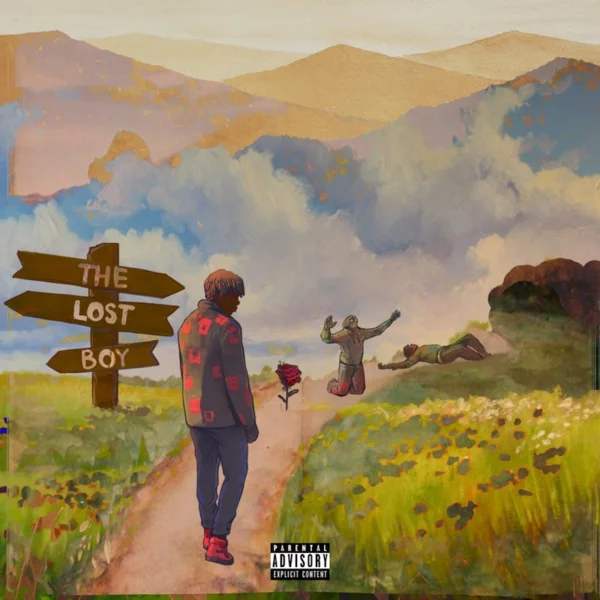Album Review: YBN Cordae is the Rap Game Mediator
YBN Cordae attempts to defy expectations and carve out a path for his rap career with his soulful debut, The Lost Boy.
Written and illustrated by Mark Yoder
Throughout its roughly 50-year history, hip-hop has been constantly evolving in both culture and sound — but change can be scary for those who find themselves in a comfortable position and see it as a threat. In rap, when a newer, shinier brand of hip-hop gains popularity, fans and artists of previous iterations are usually quick to criticize it. There have been many comical examples of clashes between the old guards of hip hop, known as “old heads,” and the youthful rap rookies. One of the most notable moments was when Ice-T complained that Soulja Boy had “single-handedly killed hip-hop,” to which Soulja Boy responded by saying Ice-T was “old as f---” and “old enough to be my great grandfather.” This eternal clash between old and young rappers seemingly erupted in the mid-2000s with a spike in popularity of “mumble rappers,” a nickname affectionately coined by Wiz Khalifa, criticizing the lyrical incoherence of new wave rappers. Many older rap artists spoke out against mumble rap, saying that it was the death of lyricism, which they viewed as the most important element of rap music. The young mumble rapper MadeinTYO astutely summed this sentiment up in his 2017 XXL freestyle, with the lines: “This that mumble rap, mumble rap, old heads really want none of that.”
YBN Cordae finds himself in an interesting position, acting as somewhat of a bridge between these two warring factions. The origin of YBN — the rap group Cordae is a member of — is as about as modern as you can get. Cordae originally met the collective’s other founding members, Nahmir and Almighty Jay, while playing Grand Theft Auto and freestyling in Xbox Live parties. Almighty Jay and Nahmir both had breakout hits with more streaming success than Cordae, but he was widely regarded as the most lyrical of the group.
He first went viral for his remixes of various rap songs including J. Cole’s “1985,” which criticized mumble rappers. Cordae responded to J. Cole’s views, and the old head community’s views in general, by lyrically defending his generation of rappers and pointing out that the old heads should be in support of young black people finding success. Many older rappers respected Cordae’s lyricism while also accepting some of the points he made. His talent even caught the attention of Dr. Dre, who invited him to his studio to work with him. With the seal of approval from the legendary Dr. Dre, the support of both the old heads and the rookies, and an impressive feature list consisting of names like Chance The Rapper, Pusha T, and Meek Mill, expectations for Cordae’s debut project, The Lost Boy, were sky high.
Photo courtesy of Atlantic Records
The production of the album has a mostly sunny and soulful quality, and Cordae does a decent job of singing the choruses of many of the songs. Cordae creates songs that appeal to fans of different styles of hip-hop while also blending them together. Tracks fluctuate between laid back reflections over simple boom bap beats, like the album opener “Wintertime,” to boastful bangers with rumbling 808s, like the single “Have Mercy.” While this transition can at times be jarring, it does not take away from the listening experience in a major way.
He is able to exude charisma and confidence and manages to not be outshined by the bright star power of his features. His collaboration with Anderson .Paak on “RNP” is fruitful, serving as one of the album’s highlights with the two bombastically going line for line about their rise to the top: “Front row? Duh, bro, we don't sit on nosebleeds / Ain't your pockets obese? They won't fit in those seats.” As a self-described “student of the game,” he is also able to prove himself by lyrically holding his own alongside widely respected wordsmiths like Pusha T and Meek Mill with rhyme heavy lines like: “And eventually flyin', lately been mentally cryin' / N----s resentin' me, I am not for the industry lyin’.”
With a few exceptions, much of Lost Boy has a similar sound and tone to Chicago rap albums like Chance The Rapper’s Acid Rap and Kanye West’s debut, The College Dropout. This similarity stems from production choices such as the infusion of soul and the addition of pitched-up samples from old gospel songs — but what truly draws the comparison is the personal subject matter and the various references to family. The song “Thanksgiving” sounds like Cordae’s version of Kanye’s “Family Business,” both referencing the nostalgia of their grandma’s cooking and having to deal with crazy aunties and uncles. Cordae also has a song later in the album named “Family Matters” that lists family members in a similar way to Kanye’s “Family Business,” but Cordae voices his concerns about their situations while they try to support his blossoming career. However, this similarity to Chicago rap is not a knock against the album, and Cordae does not try to hide it by bringing in Chance as a feature.
Throughout The Lost Boy, Cordae is focused and determined to live up to and exceed the expectations placed on him, and his intent is very clear: he wants to become one of the greats. However, as expected with any debut album, it does have its flaws. There are some pacing issues and not every line is a winner, but his potential cannot be denied — and for rap fans both old and young, Cordae will continue to be a name to watch.


